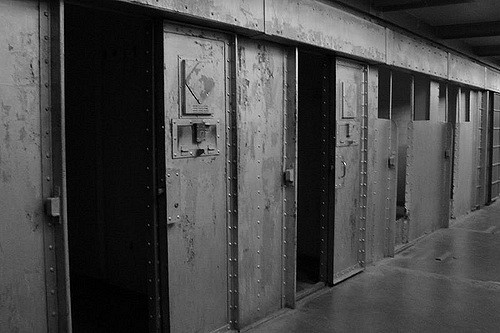Transcript
Lead In: New York State prisons use solitary confinement at the highest rate nationwide. Lobbyists are calling for a stop to this. They claim that confinement is counterproductive as it destroys prisoners psychologically and physically.
Track 1: One such voice is The Confined Arts, a program for prison inmates to showcase their creative talents. This year’s exhibit focused on solitary confinement.
SOT 1: Imagine being all alone, imagine being placed inside of a space that every day is just like the day before. A place where your last meal was at 4:44 or, some days you just don't eat at all.
Track 2: That was an excerpt of a poem by Johnny Perez, taking us inside his thought process while in 23-hour lockdown. Johnny spent three years in solitary and now works with Opportunities and Change to lobby legislators in Albany.
Track 3: Use of solitary confinement is loosely regulated. Corrections officers can throw an inmate into the quote unquote box, hole, shoe or dungeon for a non-violent offense. Children and those with mental disabilities are not spared. Ricky Jones is host of “Unlocked” on 90.3 FM, and spent five years in solitary confinement. He speaks of the disillusionment of being lost in time and space.
SOT 4: You don't even know how you look after a certain period of time. You know, you say to yourself, "Am I getting wrinkles, Am I getting grey hair?" These are little things that you begin to realize – how do you tell time? You tell time by your meals.
Track 4: The New York Campaign for Alternatives to Isolated Confinement aims to place parameters on the law. They want to limit the use of solitary to violent offenses committed while in prison. They also want to prevent prisoners with mental illnesses or anyone younger than 21 or older than 55 from being placed in solitary.
Track 5: While outreach to legislators is important, the prime focus of The Confined Arts is to educate the general public about the conditions and repercussions of confinement. Assistant Professor at the College of New Jersey, Leigh-Anne Francis, was one of four panelists.
SOT 5: Since the first jail that used solitary confinement was built, which was in 1790, immediately, wardens, activists and the prisoners themselves saw people going insane after days of solitary confinement.
Track 6: Roy Waterman, who spent 13 years in prison and now owns a catering business, puts it more succinctly.
SOT 6: I like to describe it as being alive inside of a coffin.
Track 7: TCA program director Isaac Scott arranged a call-in with two current prison inmates or quote unquote Artists on the Inside. Arrested at 18 for armed robbery, Kenneth Reams has been on Death Row for the past 20 years. He has formed non-profit organization Who Decides Incorporated to educate people about solitary.
SOT 7: I have been locked in solitary confinement for the past 22 years. Total isolation. And I mean, literally. I don't, I don't come out of my cell. They give me one hour a day to go outside but I choose not to go outside because they put you in the pen just like, like an animal. However, I'm not an animal.
Track 9: An estimated 80 to 100,000 people are in solitary confinement right now. The experience, says Tiheba Bain, leaves scars that never fade. Bain spent 7 years in prison and is now a recruitment specialist at non-profit Forging Ahead for Community Empowerment.
SOT 8: When I first got in there I thought about killing myself because it's dark, it's dreary and I felt, like, a darkness come over me. And it was like it was choking me and I couldn't get away. And the only way you can think about getting away is if you kill yourself or harm yourself.
Track 10: Jones urges those who have experienced this harrowing ordeal to come forward and share to help spread education and awareness.
SOT 9: Those of us who have experienced this and got on with our professional careers have a tendency of hiding in the closet. And now it's time I think we come out of the closet and begin to become vocal on this issue.
Track 11: Reporting from New York, this is Kindra Cooper.

